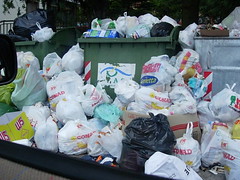 3,5 million tones of domestic garbage are produced every year in a country of the size of Greece, Italy etc. This number does not include the thousand tones of industrial garbage! In Greece, from the total 5000 dumps, 70% are out of control, don't meet the specifications but still receive one million tones of garbage per year. In Athens and other city centres 50% of the garbage is organic material ant thus 'recyclable' and 40% material from packing (paper, glass etc) also recyclable.
3,5 million tones of domestic garbage are produced every year in a country of the size of Greece, Italy etc. This number does not include the thousand tones of industrial garbage! In Greece, from the total 5000 dumps, 70% are out of control, don't meet the specifications but still receive one million tones of garbage per year. In Athens and other city centres 50% of the garbage is organic material ant thus 'recyclable' and 40% material from packing (paper, glass etc) also recyclable.
So, since theoretically 90% of the garbage can be recycled, recycling should have been a way of life. However this is not the case. European Union demands measures which shall reduce the amount of garbage, develop the alternative sources of energy and improve the dumps. In addition to this, industries are supposed to develop a system according to which producing more garbage shall mean paying bigger funds.
Greece, however, along with many other European countries, doesn't take any of these measures into account and often has to pay for indifference to the issue. As a country recycles only the 33% of the annual garbage, while Swiss, Austria and Denmark have the latest technological equipment for the job, and Germany along with Austria come in the first place, recycling the 65% of their garbage.
And Greece is only an example of a medium state, there are so many other countries around the world where the garbage reign. What should happen then to tackle the problem?
Those countries that have made recycling a way of life should criticise severely the other countries and force them to take measures. This situation must be altered; garbage is one of the worst ways of polluting the environment.
Image credit: Chiara Marra. Image licensed under a
Creative-Commons Attribution license.
Recommended Comments
Join the conversation
You can post now and register later. If you have an account, sign in now to post with your account.